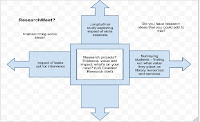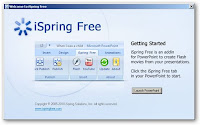
Thing 23
Conclu'sion
n. 1. termination; final result; decision;
in ~, lastly, to conclude. 2. judgement reached by reasoning.........
Whilst concluding, or reaching final thoughts means the end of 23 Things, I fully expect that this is not the end of interest in Web 2.0. for myself or for others around the University. Two summers ago, following a June Library staff development day when
Phil Bradley gave a presentation to library staff, a number of us met together a few weeks later (at the
English Faculty because that is where a lot of
good things happen!) for an afternoon of playing with Web 2.0 tools to see what might work in our libraries and what might not. You
could say that was the beginning........, 23 Things another stage......, and I am sure that in a year or two's time there will be other collaborative ventures in Cambridge exploring these tools and others. We should collectively pat ourselves on the back - I think that overall we are more collaboratively minded, we are successful at grass-roots initiatives, and we are generally a pro-active bunch of librarians! Combine that with our wonderful '
boutique' , user-focused libraries and, even better, students who are filmed saying they love the libraries, and I think that should sell the Cambridge model nicely.
Taking part in 23 Things has been something of a roller coaster ride. A sense of being over-whelmed with work and 'other things' at certain points nearly scuppered the whole programme as far as I was concerned. It all took more hours than envisaged and I spent a lot of 'home time' as opposed to 'work time' for doing the Things. Some people might not liked to have done this; but although this is a slight red herring, I wonder whether we can now afford
not to think about some element of professional development taking place outside the workplace in this day and age? In any case, I'm delighted that I persevered to the end, and feel pleased that I'm at this final point of evaluation. I liked the style of learning - bite-sized for the most part - and mostly easy to work through with options for doing more. There are some things that I would definitely like a 'proper' training session on especially when I
think that they might be useful, but haven't got the time to figure out how to apply them. (Group libraries and Zotero spring to mind!)
So.....addressing the questions:
Which Things did you find most useful, or thought-provoking, or good? What do I say 'yes!' to?
- By definition anything that I currently use regularly is good (kinda figures!) - Facebook, Google Calendar, Doodle, Zotero, Flickr, Slideshare, RSS feeds, youtube
- I like Google docs, especially the registration form tool. SO easy to use and it amazed my Computer Officer with its simplicity.
- Am still keen to make use of LibraryThing for new accessions like CSL are doing but I just haven't the time to spend on it now.
- I am a convert to blogs - I started out with my blog called Head above the Parapet because it felt exactly like that. I'm not sure that I will continue blogging personally although I would like to think I would, partly because I am thinking of doing Chartership revalidation and this tool seems to be good for reflection. Along the way however, a blog - which we use for Library News - seemed the way forward for some parts of our website. I was especially inspired by the History Faculty Library in Oxford. So, the 'Learning Hub' has been born.
- Reflection - in general. It's good for the soul.....
Which didn't you find useful at all and is downright ugly? What do I say 'no' to?
- Podcasting. - see my blog on that to explain this one.
Which might I look at again, not bad enough to relinquish altogether? What do I say 'maybe' to?
- LinkedIn,
- Delicious
- Dare I say Twitter? I fell into and out of Twitter in the course of 23 Things and have actually stopped checking it now - though I suspect I will be back there in time if only because I am essentially a pretty nosy person and I want to see what is going on. But I really do wonder how people have time to distract themselves all day with Twitter. Maybe they don't get the number of emails that I do, which are distracting enough - or maybe their jobs are more monotonous than mine! I rarely do anything like the same type of job every day and suspect that I would find it difficult to process any more information than I currently do. Having said all that I do use facebook for distraction!!
Which have you persisted with?
I persisted with Google docs - to the extent that I used them as part of the Committee preparation but not again until I was able to apply the registration form for the film launch - and then all of a sudden I have found myself using more of the docs. Especially useful when working between home and the library and remote access to the work server is rather painful.
I played a lot with ppts in slideshare until I discovered that I couldn't get animations and transitions to work in ppts loaded to slideshare. I've discovered iSpring though and it's very simple and effective.
What about Web 2.0 and social media?
There are clear distinctions about how Web 2.0 tools get used. There are those that have been put to use in developing services to libraries and for the benefits of users, and there are those that are for the benefit of our personal skills improvement or for workflow improvement in our libraries. I am drawing some of them to our users' attention this October and as usual I will run Zotero/Endnote sessions to introduce students to this information management tool.
How do you think they are shaping library services?
Library services should be shaped by the users of that service and not by the tools. If the tools dictate what we do, then shame on us.

 Thing 23
Thing 23 The Cambridge Libraries film - 'The Perfect Desk' - will shortly be launched - a special meet for those who can make it on 7th Sept means that you can see it then, enjoy a drink and enter a prize draw for a £25 voucher. The film will be posted on the University's youtube site and available for the public to see!
The Cambridge Libraries film - 'The Perfect Desk' - will shortly be launched - a special meet for those who can make it on 7th Sept means that you can see it then, enjoy a drink and enter a prize draw for a £25 voucher. The film will be posted on the University's youtube site and available for the public to see!


 It's an interesting tension.
It's an interesting tension. My Endnote and Endnote Web training sessions have faltered at the point where my own experience with referencing differed to that of an Arts student. I'm a social scientist and had never taught students who needed to use footnotes - which is what Arts students use in Cambridge. Imagine the frustration that the only way to use Endnote and footnotes satisfactorily together meant that a specially designed 'style' was required - I eventually discovered that UCS had created one; one which allowed a footnote to be edited as much as one pleased. I had been promoting Endnote Web but realised that this was even more frustrating for Arts students as they have minute, but essential changes to make to ANY style. Endnote Web does not allow self-editing of bibliographic styles. Students were not happy with making the changes to their footnotes/bibliographies at a later stage.
My Endnote and Endnote Web training sessions have faltered at the point where my own experience with referencing differed to that of an Arts student. I'm a social scientist and had never taught students who needed to use footnotes - which is what Arts students use in Cambridge. Imagine the frustration that the only way to use Endnote and footnotes satisfactorily together meant that a specially designed 'style' was required - I eventually discovered that UCS had created one; one which allowed a footnote to be edited as much as one pleased. I had been promoting Endnote Web but realised that this was even more frustrating for Arts students as they have minute, but essential changes to make to ANY style. Endnote Web does not allow self-editing of bibliographic styles. Students were not happy with making the changes to their footnotes/bibliographies at a later stage.
 ........and just can't manage another deluge of information?
........and just can't manage another deluge of information?